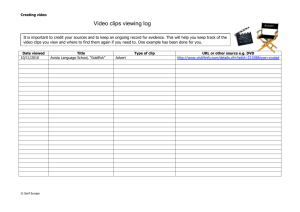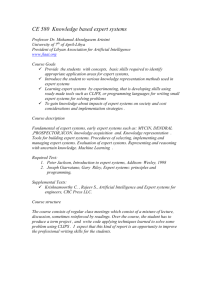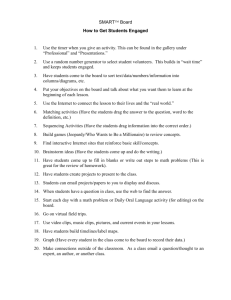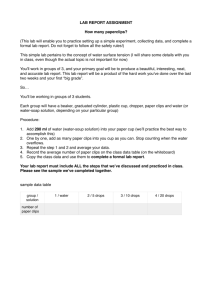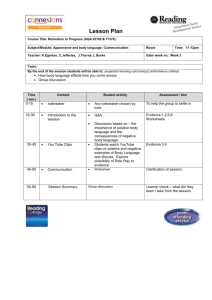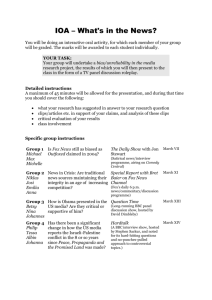project management
advertisement
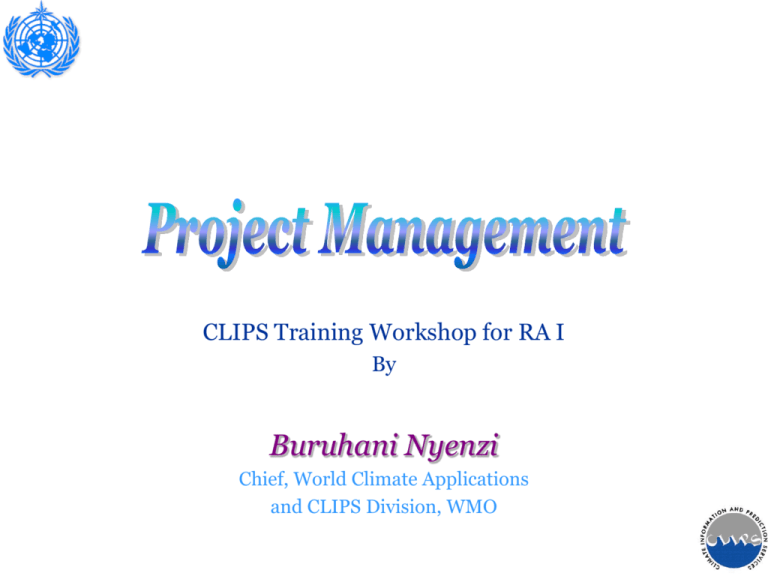
CLIPS Training Workshop for RA I By Buruhani Nyenzi Chief, World Climate Applications and CLIPS Division, WMO Objectives of Project Management 1. . To ensure that the project is correctly designed to meet its objectives 2. . To ensure that the project is completed on schedule, within resources and budget 3. . To provide a mechanism for monitoring the project To ensure that the project is correctly designed to meet its objectives • ensure that the project objectives and outcomes are fully agreed by all involved • ensure that the objectives are achievable • ensure that the objectives satisfy customer needs To ensure that the project is completed on schedule, within resources and budget • ensures that the resources and budget are agreed and are consistent with the needs of the project • ensures that the life of the project is clearly defined To provide a mechanism for monitoring the project • ensures project does not depart from agreed path • provides mechanism for examining project progress (quarterly progress reports, agreed regular communication….+ ?????) • provides mechanism for correcting or stopping failing projects (project restructuring) Managing Director controls resources and programme Operations Managers Ship’s Captain Ship’s Crew The Sponsor is a (are) Senior Manager(s) who hold(s) responsibility for resources, and, in particular, funds It is the Sponsor’s role to ensure that the project is an appropriate activity that satisfies programmes requirements and justifies funding For CLIPS Projects Sponsors might include CLIPS Project Office (CPO), USAID, DFID, OGP, etc. Often consists of three members (could be more, perhaps just one) Overall responsibility for ensuring monitoring and successful outcome of project - report to Sponsor Regular meetings with Project Manager to monitor project progress In CLIPS Projects the Project Board may well be a group, say, from the Nation(s) involved, e.g. CPO Responsible for day-to-day management of the project and its resources Provides regular reports to the Project Board Normally responsible for restructuring, if necessary basic project design and In CLIPS Projects would normally be someone (perhaps a CLIPS Focal Point) from the nation(s) involved This is where the real work is done - but the buck stops at the Project Manager Controlled by, and report to, the Project Manager In a CLIPS Project the team would normally be composed of individuals from the nation(s) involved, perhaps augmented by experts from elsewhere BUT DON’T FORGET: • computers • specialised equipment • vehicles • etc Written by the Project Manager, Agreed by the Project Board, Accepted by the Sponsor Details all aspects of the project, including outputs, resources and schedule Basic document for project initiation, project monitoring, project adjustment (if needed), and project closure Essential Contents of a Project Document Project Scope (Problem and Background) Justification Project Goal Project Objectives (object. and plan. activis) Project Outputs (results and outputs)b Situation at end of Project Activities & Method ? Resources (Budget) Project Schedule (Workplan) Statements of problem and what the project covers ... … and statements of what the project does not cover These are broad statements of the scope - detailed objectives statements follow later This project deals with the application of climate predictions in managing a hydro-electric power generation facility. It does not cover use of climate information, the development and creation of predictions, or the development of reservoir control curves. Project objectives are statements of what it is intended to achieve in the project The objectives of this project are to: • examine the links between climate variations and hydropower generation • examine the performance of models in predicting these variations • establish a method for using these predictions to improve management of power generation Project outputs are tangible products produced during the course of the project, rather than results (which were handled under objectives) Project outputs include: • a manual for hydro-power managers covering use of climate predictions • an estimate of the value of climate services in hydro-power generation A clear statement that defines the conditions to be satisfied that will determine that the project has been completed This project will end when either: The operators’ manual is completed or on August 31 2002 In some respects the most important section - gives details of the approach to achieving the project objectives Development of the project method requires that we think through the project carefully, step by step. Assessment of the value of the project will be achieved through using the ROC approach • What needs to be done • what are the steps • what order of the steps • who does each step • who is responsible • where? • What resources - time, equipment, funding, data, intellectual resources (training) • what is already available? • Risks - what can go wrong?; what prevention • links to other projects • consultation • institutional arrangements • method of evaluation Itemises all the resources of the project and how they will be used: • man days/months/years • equipment • funding E.g. Writing the manual will take 3 man months Often used to compare the overall benefits of two or more projects against each other Involves a calculation of the rate of interest that would need to be achieved had the project funds been invested and had achieved the same outcome as anticipated from the project Many spreadsheets and project management software include IRR calculations List of key dates, including: • board meetings • reports due dates • milestones, including dates for delivery of specific outputs • project review dates • project completion date Often done as a timeline, PERTT chart, etc. Project monitoring is a critical aspect of project monitoring. It permits adjustment of a project if necessary. Even cessation if required. Achieved through interim reports which contrast achievements against the schedule, board meetings, and regular reviews by the Project Manager of milestones, resource utilisation, etc. Essential!!! Includes lessons learnt Followed by:- Write a project document for one of the following projects in your country: 1. Development of an empirical forecast model 2. Creation of a climate atlas 3. Improvement of crop yields (select an appropriate crop) through application of seasonal forecasts • Training - FP (ongoing); NMHS; country • data - collection; management; information • prediction - national models; access to models; downscaling; interpretation; forecast creation • monitoring - data; management; presentation • services - contact; education; feedback; applications; (pilot) projects; decision processes; applied research • resource mobilization - justification; process; equipment • collaboration
